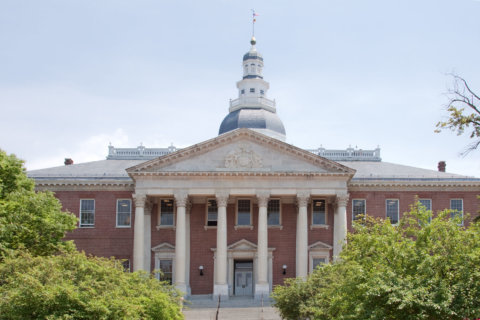This article was republished with permission from WTOP’s news partners at Maryland Matters. Sign up for Maryland Matters’ free email subscription today.
This content was republished with permission from WTOP’s news partners at Maryland Matters. Sign up for Maryland Matters’ free email subscription today.
While hundreds of bills will zoom across the desks of the presiding officers of the House and Senate on Monday as the legislature wraps up its 90-day session, much of the serious work of tying up loose ends will be happening off the floors, in hurried huddles of six senators and six delegates – plus any number of observers – negotiating last-day conference committee reports.
About a dozen conference committees have been formed in the last several days of session. Others are certainly likely on the final day, including one to resolve differences between the House and Senate on whether to create a Prescription Drug Affordability Board. While the House approved a bill to establish a program to set price caps on certain drugs, the Senate bill has been amended to require a year-long study.
Here’s a quick glance at some of the other bills negotiators will be working on Monday:
HB994 Labor and Employment – Criminal Record Screening Practices (Ban the Box)
The House version of the bill would prohibit employers including on a paper application a question or other request for information regarding an applicant’s criminal record. The Senate version of the bill would prohibit employers from requiring a job applicant to disclose information about any criminal record until the first in-person interview. However, amendments that passed in the Senate removed prohibitions on employers from checking the state’s Case Search website, social media or other sites before an interview. The penalty provisions also differ in the House and Senate versions of the bill.
Conference committee members: Sens. Malcolm Augustine (D-Prince George’s), Antonio L. Hayes (D-Baltimore City) and Joanne C. Benson (D-Prince George’s); Dels. C.T. Wilson (D-Charles), Brian M. Crosby (D-St. Mary’s) and Courtney Watson (D-Howard).
HB122 Protective Orders – Relief Eligibility – Rape and Sexual Offenses
The House bill is aimed at allowing victims of rape and sexual offenses to seek relief under the state’s domestic violence protective order statute. Such victims are limited under current law to seeking peace orders, which last for a shorter period of time and don’t get the same level of attention from law enforcement, advocates say. The Senate version of the bill altered rape victims’ access to the existing peace order process, including removing the requirement that peace orders can only be issued if the respondent is likely to assault the petitioner again in the future.
Conference committee members: Dels. Jazz Lewis (D-Prince George’s), Emily Shetty (D-Montgomery) and Lesley J. Lopez (D-Montgomery); Sens. Mary L. Washington (D-Baltimore City), Katie Fry Hester (D-Carroll and Howard) and Jill P. Carter (D-Baltimore City).
HB743 Criminal Procedure – Incompetency and Criminal Responsibility – Dismissal of Charges
As amended in the House, the bill would change state law to say that the required dismissal of a criminal charge against a defendant found incompetent to stand trial is a dismissal without prejudice. The Senate version of the bill extends from five to 10 years, the time after which a court is required to dismiss a charge of first-degree murder against a defendant found incompetent to stand trial.
Conference committee members: Dels. Charles E. Sydnor III (D-Baltimore County), David Moon (D-Montgomery) and Lauren Arikan (R-Baltimore and Harford); Sens. Susan C. Lee (D-Montgomery), Michael Hough (R-Frederick) and Jeffrey D. Waldstreicher (D-Montgomery).
HB1001 Correctional Services – Restrictive Housing – Reporting by Correctional Units and Requirements Relating to Minors
This bill seeks to update policies around the placement of minors placed in restrictive housing units at state correctional facilities. The House and Senate versions of the bill have different reporting requirements and a difference in the standard for placing a child in restrictive housing. To be placed in restrictive housing, the House would require “immediate and substantial” risk of harm, while the Senate bill states “immediate or substantial” risk. The bills also differ when prescribing access to recreation, education, and programming for youth in restrictive housing. The Senate bill says such programs should be provided “unless it would pose a risk of physical harm to the minor or another.” The House bill says access to such programs should be “maximized.” The House bill allows for a cause of action in the courts if a child is placed in restrictive housing in violation of the bill’s provisions. The Senate bill does not include the same provision.
Conference committee members: Dels. David Moon (D-Montgomery), Debra M. Davis (D-Charles) and Michael E. Malone (R-Anne Arundel); Sens. Michael Hough (R-Frederick), Mary L. Washington (D-Baltimore City) and Jeffrey D. Waldstreicher (D-Montgomery).
SB269 Comprehensive Flood Management Grant Program – Awards for Flood Damage and Funding
Prompted by serious flooding events in Ellicott City in 2016 and 2018, this bill creates state grants to aid localities that have experienced $1 million or more in infrastructure damage caused by a flood event since 2009. The House bill mandates $5 million in annual funding, while the Senate bill gives discretion to the governor for the program’s funding level.
Conference committee members: Sens. Douglas J.J. Peters (D-Prince George’s), Melony G. Griffith (D-Prince George’s) and Adelaide C. Eckardt (R-Middle Shore); Dels. Stephen W. Lafferty (D-Baltimore County), Andrew Cassilly (R-Cecil and Harford) and Tawanna P. Gaines (D-Prince George’s).







